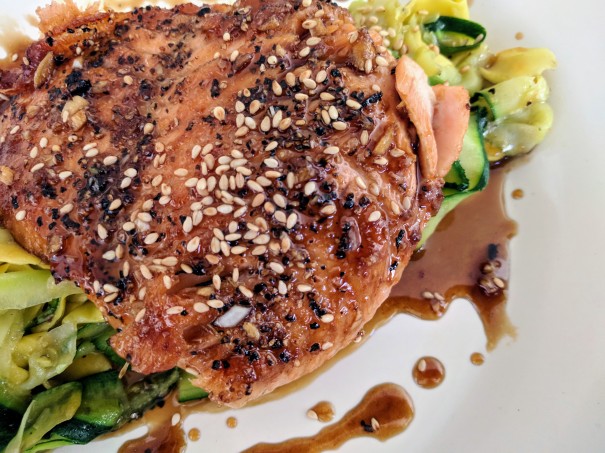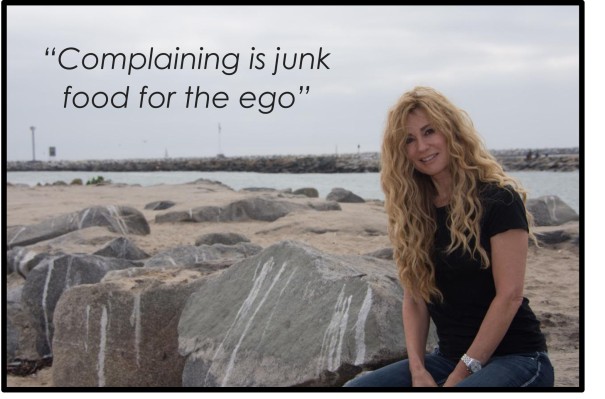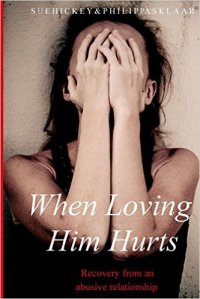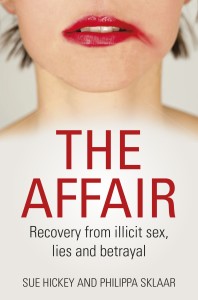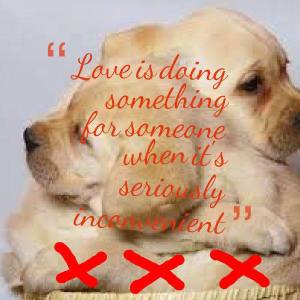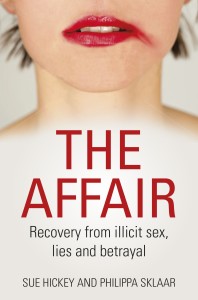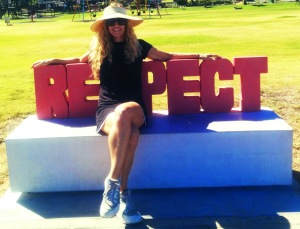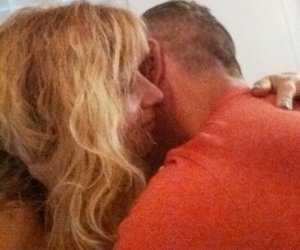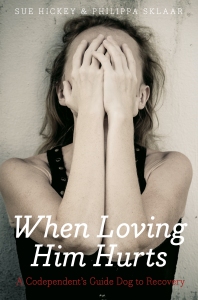
Abused women are voiceless and faceless – please help
Say NO to abuse
“When Loving Him Hurts” will be available in bookstores in July.
NOT GOOD ENOUGH! The majority of women still don’t read self-help books. Most abused women think they are inadequate not that they are overwhelmed by the power imbalance in their relationships. Most young women don’t heed the signs because they don’t know what they are. Most people think abuse is purely physical. Abuse is psychological, emotional, financial and sexual. Did you know that? If you did you are luckier than most or unlucky enough to have had to attend to it.
Unless a woman has been raped or assaulted she cannot report it. NO – SHE CANNOT JUST LEAVE! There are children to be considered, rent to be paid and disempowerment to be overcome. There is no way to evaluate the cost of abuse to the economy unless it results in litigation such as a restraining order and most don’t. This is a silent and invisible stain.
If National Women’s Day is to be in any way meaningful you need to do more than make her breakfast. If social responsibility is to be meaningful it must include the women who aren’t starving (just invisibly financially compromised), who aren’t being raped (just mangled in their sexual relationship) and not homeless (just voiceless). In a country characterised by scarce resources, the abusive relationship and the emotional health of women is likely to stay firmly on the back burner.
What do we want?
We want women in the workforce to get their copies free. They are more likely to read a gift than buy a book they don’t know is available and don’t know that it applies to them. We would like corporations to order the book, which will include your personal message to the women in the form of a tipping page at the front, and give it to the entire female workforce. In this way you contribute to the education of women. “Healthy women own a sacred “NO”. Most women only attend to decent shoes”.
Make National Women’s Day meaningful by giving a helpful gift. Add your “NO” to abusive relationships by teaching women to recognise them and not just endure the consequences. These women are walking amongst you and you have no idea who they are or what their lives look like. When Loving Him Hurts informs about unhealthy relationships and unhealthy women. It is the Guide Dog to women in these relationships and the warning siren to those who aren’t but in the fullness of time may find this information sanity-saving.
To order the book and discuss the tipping page or for any further information please email us at abuseendswhenyouloveyourself@gmail.com
“WHY DOESN’T SHE JUST LEAVE?”
Because she doesn’t understand the abusive pattern, the profile of the abuser or her own codependency – Part
Because she doesn’t have the skills required to manage herself or her relationship – Part 2
Because she is in survival mode and has not begun the journey of healing – Part 3
We hope you find this material engaging and look forward to hearing from you.
Overview
When Loving Him Hurts breaks open victim based myths on domestic abuse.It’s the result of a collaboration between Sue Hickey, a South African therapist with 25 years experience and Philippa Sklaar, an American victim/survivor of domestic violence. It’s a unique look at how and why women perpetuate the dance of abuse. This book is unafraid to challenge politically correct views on domestic abuse.
By way of an example from page 69 When loving him hurts:
THE UNDERBELLY OF MY BEAST FROM BLOG POST OCTOBER 22, 2014

Last night Sue was going up the stairs to the guest bedroom when I announced that I was to blame for the abuse.
“What do you mean?” she asked shocked as she sat on the steps not sure what to do with either the coffee or the information.
“ I chose every single one of them. I had lots of opportunities to leave when the abuse started but I needed that abuse. I needed his pathology to fit in with my mine. My pathology was that love was an obsession not dissimilar to an addiction. I was no different to a drug addict. I was consumed with him.
I needed my fix the way a drug addict needs there’s. Sue was confused so I tried to explain by describing my day-to-day life.
“The focus of my day was my labors of love. What errands could I run, what food could I make, what outfits I could wear and what could I do to earn the applause and approval when he came home. How could I show him how indispensable I was? And that was another example of my manipulations.
The business of my day began when he woke up. I had buttered his toast to the edges the way I was sure no one else would have done. Not only had the toast been buttered to perfection but the timing around the delivery of the toast and coffee had become an art form. Having successfully achieved breakfast on time it was now time for wardrobe consultation. I was smug in the knowledge that I was The One. Don’t for a minute forget that affairs are the norm. The abuser always manipulates with other women. The hidden truth was that my manipulations were no less deceitful.”
“How so?” Sue asked.
“In lots of ways. Firstly I manipulated him to take me to every single event and function so that my presence in his life was as public as possible. I dressed to the nines and I lauded it over other women. In my mind I had the prize and shamelessly I showed off. I was a bigger liar than he was. He showed me exactly who he was. He was an addict, an abuser, and a cheat. I pretended to be something that I wasn’t.”
“Had he given you everything you wanted as in appreciation, kindness and consideration, would you have stayed?” Sue asked.
“No, I would have been bored stiff. Decent men don’t supply enough drama to justify being consumed. That’s why I wasn’t a victim. I choose him and he performed perfectly.”
“It still sounds like a difficult and painful way to live”.
“I have learned that there is always a payoff for destructive behavior. Mine was that as long as I was focused and consumed by his life I never had to do anything worthwhile with my own. He was the perfect camouflage for the fact that I was doing nothing with my life.”
C O N T E N T S
PART 1
- UNDERSTANDING THE ABUSIVE RELATIONSHIP
- 1.1Physical Abuse
- 1.2 Emotional Abuse
- 1.3 The Jekyll and Hyde Problem
- PART 1 ASSIGNMENT 1 – INTRODUCE YOURSELF
- 2.DISCUSSION ON THE ABUSIVE RELATIONSHIP
- 2.1 Control by Criticism
- 2.2 Using Money as a Weapon
- 2.3 Sex as a Form of Punishment
- 2.4 Destroying Your Support Network
- 2.5 Destroying the Family Support Network
- 2.6 Conflict Management = War
- PROFILE OF THE ABUSED WOMAN – CODEPENDENCY
- WHY DOES HE ABUSE ME?
- 4.1 Damaged People Damage People
- 4.2 The Underbelly of the Beast
- FIND THE LENS
- WHY IS LOVE NOT ENOUGH TO MAKE HIM CHANGE?
- PART 1 ASSIGNMENT 2 – EXPLORE YOUR RELATIONSHIP 4
PART 2
- MANAGING YOURSELF IN THE ABUSIVE RELATIONSHIP
- 2.1 End Denial Welcome The Ugly Truth
- 2.2Pick Your Battles
- 2.3 Hook Bait And Escape
- 2.4 Cultivated Indifference
- 2.5 The Nodding No
- 2.6 From Worry To Warrior
- 2.7The Sentence And The Silence
- 2.8 Change Your Attitude
- PART 2 ASSIGNMENT 1 – DISCUSS YOUR DENIAL OF ABUSE
- PART 2 ASSIGNMENT 2 – SUBMIT YOUR OWN PROGRESS REPORT
PART 3
- HEALING YOURSELF
- You may not be the problem but you are the solution
- 1.RESENTMENT – YOUR DAILY POISON
- 1.1 Change Your Thinking
- 1.2 The Cancel Stamp
- 1.3 Replacements – Fire Resentment, Hire gratitude
- PART 3 ASSIGNMENT 1 – RESENTMENT
- PART 3 ASSIGNMENT 2 – GRATITUDE
- RECLAIMING YOUR SELF ESTEEM
- CREATIVITY HEALS
- 3.1 Understanding Creativity
- 3.2 Create A Collage
- 3.3 In Conclusion
- 4.BELIEF SYSTEMS – BELIEVE IT OR NOT
- PART 3 ASSIGNMENT 3 – RECLAIMING YOUR SELF ESTEEM
- REFLECTIONS ON REFLECTION
ABOUT THE AUTHORS
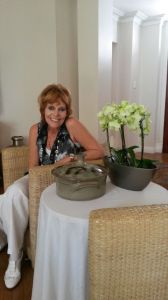
My name is Sue Hickey and I have been a therapist in private practice for over twenty-five years. I started my practice in my late twenties and many of my clients were women who were desperately unhappy in their marriages and had husbands who were unwilling to come to marriage counseling. Some claimed to be too busy and others simply denied that they contributed to their wife’s unhappiness in any way. Some of those women came claiming they were suffering from depression or anxiety. All suffered with a lack of self-confidence and many believed that they were the reason for the unhappiness in the marriage.
When we see a doctor we explain our symptoms and hope for an accurate diagnosis from which will come a specific form of treatment designed to attend to our specific symptoms. However when we arrive we usually have some idea of what is wrong with us. Beginning therapy is not that different. We arrive with what is called the presenting problem. For example, “I feel depressed all the time and I think my husband has fallen out of love with me. I am anxious and have no idea what to do”. Unlike a medical session the process is much slower and the client is required to explain what their lives look like and feel like. They tell their story. In the telling many things become clearer and patterns come to light that are often difficult to see unless the story is told.
Often those stories were about men treating their wives and partners in such a way that was clearly unacceptable. I used to think that it sounded as though there was a man out there married to all these women because their stories had so many similarities. They were narcissistic men, insensitive men, serial womanizers and these women struggled to understand why they were being treated the way they were. They were struggling to salvage their crumbling self-esteem from this onslaught of criticism and cruelty. One day one of my clients phoned me to say she had found a book called “Men who hate Women and the Women who Love them” by Dr Susan Forward. She bought me a copy and I read it and promptly bought five more copies for my other clients. I confess that I didn’t like the title because while they qualified as the worst husbands on the planet I never had the impression that they hated their wives. Dr Susan Forward, whose book I highly recommend, explained that these men were misogynists. By dictionary definition a misogynist is a man who hates women and clearly the behavior is hateful but I don’t think they hate their wives or women in general. They do however create abusive relationships. There is a pattern of abuse so similar and so uniform that in my more idle wonderings I did think that it was the same man.
Let’s call the client who found the book Anna. It’s not her name but she is the reason that this manual is in existence. However, back to the beginning. Anna and I talked about how many other clients had been given the book and she suggested a support group. I talked to the others and they all agreed. So about twenty years ago we began a support group for these women and we advertised that group for newcomers who might want to join. A few months later I received a call from a radio station asking if we would be prepared to talk on radio. The matter was taken to the group and they all agreed that Anna and I would go on a talk show. She of course was to remain anonymous. The radio talk show was a huge success and we were very pleased with how we conducted ourselves.
Then the letters began to arrive at the radio station. There were literally hundreds of them and my phone rang off the hook for weeks. There were hundreds of women asking for help and identifying themselves finally as abused women in abusive relationships. We were of course completely unprepared for that and frankly had no idea of what to do or how to handle it so we did nothing. I got married and had a child. Our support group came to an end and life continued and over time I have wondered what happened to them. I saw one of them in an exam hall and it made me happy to see her there. Of course Anna was on my mind often as she had been so instrumental in the creation of the support group. Earlier this year I ran into her in a coffee shop and we arranged to meet and talk. She is one of the women who had decided to stay in her marriage and I needed to ask her if she was glad of that decision after all these years. I wanted to know if he had ever changed. I wanted to know if it had been worth it.
She will talk to you about that in her introduction. Once again she has been instrumental in this workbook. She asked me to do it again. Much has changed in the last twenty-five years not least of which is the internet. So this time instead of a support group for ten or so women we decided to take it to the internet and see if we could assist more women. We have both been painfully aware of neglecting to attend to the bag of letters and barrage of appeals we received.
That support group of ten women was one of the most powerful learning experiences of my career. It gave everyone the sure knowledge that they were not in it alone. It was not their fault. Their shame and humiliation at being treated the way they were was not theirs alone. Just turning up every week was an act of assertion. Many lied about where they were and enduring many rows and punishment for their attendance but they attended. They were given the opportunity to tell their story to other women who had endured the same. Their despair and loneliness was respected. No-one said stupid things like “so why don’t you just leave” as though that is like changing your socks. They came to really understand that it was not their fault. It was not as a result of their inadequacy.
There was a time that I was afraid at how much anger they seemed to unleash. They began to fight back and I remember feeling afraid for them and afraid that I would be responsible if anything awful happened to one of them. They began to understand that they had a decision to stay or go and that if they decided to stay they had to stay differently. They needed to understand the abuser and the abusive patterns. They needed to fight back but also be safe. They needed to rebuild their self-confidence despite the constant criticism and ridicule that they endured.
Each one of them is one of my unsung heroes. They go out there every day and survive in some form or another. Many of them appear to the world to be one of the privileged few, well- heeled and fortunate but they aren’t. I dedicate this manual to each of them who arrived every week and taught me how painful it can be when love hurts and how strong one needs to be to survive.
As an aside –
We all know there are abusive parents, abusive bosses and abusive friends. When we ran the support group a man applied to join the group as he was being abused by his wife. The group elected to reject his application feeling that they would be more comfortable with a group of women. This manual does not cover the full range of abusive situations that people find themselves in. However the intimate relationship has its own particular dynamic and so this manual applies only to women who are in emotionally abusive relationships with a husband or romantic partner.
 My name is Philippa Sklaar. I was born, raised and wrecked most of my life in South Africa.
My name is Philippa Sklaar. I was born, raised and wrecked most of my life in South Africa.
In 2001 I boarded a plane to America to start my life afresh. At the time I told myself and anyone who asked, that I was immigrating to the USA because it had been the “land of dreams” to me as well as to so many others. I intended to create an opportunity for my son’s to immigrate. With the benefit of hindsight I think the truth is that I fled from South Africa. I had just endured a second failed marriage. The abuse that I experienced at his hands made me damaged in places I never knew existed. I was more devastated and ashamed than I was prepared to acknowledge even to myself. With my bravest face and fearful heart I arrived in the USA determined to rectify my life. I was well aware that I had in some ways contributed to the failure of my life. I had selected not one man but two, who had treated me appallingly. Twice I had believed that marriage would transform a difficult and hurtful relationship into “happily ever after”. Twice I had believed that if I loved the Beast well enough he would become Prince Charming and I would live the life of a Princess.
Intellectually I was well aware of the fact that I had much reflection as well as hard work ahead of me. I needed to work on building my life from scratch as well as changing my thought patterns. I was not in denial that in some way I was part of the problem and I resolved to be hyper vigilant in the future. It never ceases to amaze me that we can all have a perfectly sane narrative in our head but the only way we know we are healed is when that narrative manifests into our life. I did what so many people do – I attempted a geographical escape. I thought I could leave my problems behind me. I knew that I needed to change my relationships but the problems had been left behind in South Africa. It was despite, what I told myself, a classic case of geographical escape. The fundamental truth was that I had taken myself with the problems and relocated us to the USA.
I moved to Los Angeles and settled myself in with aplomb, despite my fear and loneliness about my uncertain future. After a few months I met another man who I was convinced was completely different from the men I had married in South Africa. Well I was wrong and it took a third, very damaging relationship for me to look again.
Sue had been my therapist in South Africa and in the grief and devastation of my third failed marriage I called her. She talked me through that divorce over long distance telephone calls and e-mails. I needed to speak to some-one who had known me for a long time. Sue had warned me against my second marriage and had patiently picked up the pieces throughout its collapse. I needed some-one who knew my whole story and some-one who knew the whole story on abusive relationships. It was she who could help me identify the pattern yet again – the wolf in sheep’s clothing. We have become close friends in the process.
Ever since I arrived in America I have been inviting her to visit. Sue and I see one another from time to time when I am in SA and we talk on the phone. Sue is what I call a “reluctant traveler”. In April 2014 I moved to the Berkshires and as I walked into the house and saw a panorama of trees and a hummingbird on the ledge I just knew she would love it. I picked up my phone there and then and called her, described my vision and reissued my invitation. To my shock and delight she accepted. It was the trees that did it. Thank heavens it was summer – it was impossible to get her to come inside. She was completely captivated by the view of the ski slopes (of which there are none in SA) the trees and the humming birds.
Sue told me that she was working on a course for women in abused relationships. She told me about the bag of unanswered letters that had sat heavily on her conscience. I have always known Sue to be a fan of AA as the best support system for any alcoholic. The reason, she claims, is that no matter how hard you study an issue the nuances are always best understood by “some-one who has been there”. She believes that a recovering alcoholic gains more confidence from seeing some-one who has actually “done it” than from the person who explains why and how it should be done.
Sue invited me to assist her in the writing of this course in healing yourself in the abusive marriage. Like the recovered alcoholic has much to offer she believes that I do too. I am so excited to be a part of this project and with heartfelt appreciation for her offer I accepted.
While she was my guest we spent many, many hours and drank copious amounts of coffee as we trawled through the work she had already done. She asked me to go back and remember those times. We have analyzed and dissected incidents as we did so often in the past. However, in the past I was distraught most of the time. In the past I just wanted her to tell me or help me decide what to do next.
Now my whole life is different and I can look back with a quiet reflection, not static with hurt and regret, and observe what was going on. Sue calls that the “reflection of the enlightened witness”.
The time was incredibly valuable to me because amongst other things I had a real opportunity to see how much has changed for me. I no longer just think differently. Those thoughts are a part of me now. I have transformed – not just changed my thinking. She has had some resistance from some women to “go back and look again” but for me it was easy and we spent much time in raucous laughter about the things I had done. At the time I was too ashamed to tell even her what I was really doing half the time. Not telling is a form of denial that allows us to not fully interrogate our behavior. The most valuable realization I have had during this time is that I really am like the recovered alcoholic not the dry drunk. I finally know that I do actually have much to offer and more importantly that I want to offer it. I want to assist women who like me, felt misunderstood and ashamed of our inability to let go of a relationship that was killing us. It’s like wanting to hug a shark – why on earth would you do that? I understand because I have been there, emerged damaged and broken from there and then heaven forbid – went back!!! I know what it feels like to yearn for the love of a man who pulled out your hair, spat in your face and tried to choke you. I know what it feels like to tell people you are back there and watch their faces and see them thinking, “then you deserve what you get”.
I find it remarkable that after all these years in which I have issued invitation after invitation it was on this occasion that her life circumstances made it possible for her to accept. She told me that she had Googled the Berkshires and the photograph was of the trees in the fall. That got us talking about nature’s perfect understanding of timing. The Universe is no less skilled and we are both excited and in awe of the perfect timing that has made this project possible.
I also know what an absolutely inspirational walk it is when you are through the first few steps of really healing yourself. There is a place past managing yourself in an abusive marriage and that is the exciting part – healing from the inside out not from the outside in.
It is an honor and a privilege for me to be a part of this project. I know that I needed a helping hand through my darkest times and Sue has been that hand. Now I would like to be the hand that holds yours when you begin this journey.
“When I could no longer stand the person I was, I began to heal. It was a painful beginning and a magnificent journey” Philippa Sklaar
WHAT MAKES WHEN LOVING HIM HURTS RELEVANT ?
“Every healthy woman needs to own a firm “NO”. Most women attend to good shoes instead” Sue Hickey
Once again domestic abuse has hit the headlines in the form of the Ray Rice incident, USA and Oscar Pistorius’s famous murder trial for the death of Reeva Stenkaamp in South Africa. It remains apparent that domestic violence is not confined to socio-economic and is rife in affluent society.
The domestic violence hotline in the USA received over 70,000 calls from women requesting assistance. Quite clearly the need for some form of intervention remains as high as ever. Our second author is the survivor of several abusive marriages. It took her several years to understand that abuse takes many forms outside physical violence. Many women fail to recognize the profile of an abuser. They also fail to recognize that their codependency plays a significant part in the cycle of abuse. This book addresses the age-old question, “why doesn’t she just leave?” This book is provocative in so far as it challenges women to be the solution to the problem instead of the victim of the problem.
Despite media coverage the subtext in an abusive situation remains “first time a victim, second time a volunteer”. We believe that until those myths are exposed the subtext that holds women responsible for their abuse will remain intact. If truth be told women in abusive relationships hold themselves responsible for their abuse because they fail to understand why it’s so difficult to extricate themselves from the relationship.
Stories are always more compelling when told by the people who lived them. This is even truer when it comes to surviving abuse because abused women are desperate for hope and a happy ending.
PART 1 Discusses the abusive relationship and the profiles of the abuser
“If roses are the flowers of love, should the thorns not warn us?” Sue Hickey
The Bully Barometer on page 11 shows how the abusive relationship is linked to constant criticism, inappropriate humor, money manipulation, and degrading sexual behavior. Many women fail to recognize it in the absence of physical violence. The Underbelly of the beast explains the profiles of abusive partners
PART 2 Discusses skills development required whilst one is still in the relationship assuming that it is not always practical to leave as recommended by most books.
“Sometimes abuse is so quiet that it remains unseen and unrecognized for years. The result is an insidious but relentless diminishment of the woman who lives in it”. Sue Hickey
One of the unique aspects of this book is that in the absence of physical violence it allows “staying” to be a legitimate option. It also assumes that premature leaving will almost always result in a repetition of the abuse cycle.
PART 3 Is about victims becoming solutions to the problem by healing themselves.
“Become a manager of your own toxic waste” Sue Hickey
In order to do so they have to recognize they participate in the abuse cycle and are not merely victims.
From page 154 When loving him hurts.
FROM HERO TO ZERO FROM BLOG POST AUGUST 31, 2014
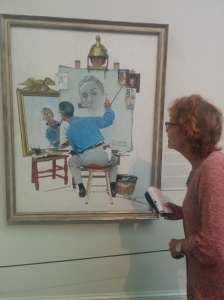
When I was in the USA spending time with Philippa we visited the Norman Rockwell gallery. If any of you are passing by or are close to Stockbridge please don’t miss it. What a treasure! For those of you who don’t get the opportunity the picture on this blog was taken at the gallery. It is a painting of the artist doing a self-portrait using a mirror. This is obviously the most accurate rendition of a self- portrait.
Would it surprise you to learn that both men and women use their relationships to distort their self- portrait?
“Beauty is in the eye of the beholder”
It is for this reason that falling in love is one of the most compelling experiences we have. It is why we are often reckless and undiscerning when falling in love. When a woman meets a man who is excited by her she feels beautiful, sensual, young, and blessed. When a man meets a woman who is excited by him he feels powerful and bullish. We love the reflection of ourselves through the eyes of the other. It is their gift to us and ours to them – to see ourselves beautifully.
Philosophers always say that romantic love is the poorest, lowest form of human love because it is essentially self-centered instead of being other-centered which love should be. We love the other because of what it is doing for us. Those early stages are typically referred to as the honeymoon phase – those balmy days when we feel perfect, when we can do nothing wrong, when nothing other than each other feels real. We feel almost divine – no wonder we are compelled down often dangerous paths.
Philippa talked about how this typified each of her destructive marriages.
“They hung onto my every word. I felt clever, insightful and above all, indispensable. I loved it”.
Well who wouldn’t?
Her one husband needed help with his substance abuse problem. It was she who convinced him to attend AA. It was her solace, tender loving care and exquisite meals that coaxed him past his depression. The beginning of her last marriage was almost identical. He was recovering from his divorce when she met him. He depended on her to guide him, counsel him and love him back to his mental and emotional health. She recalls that early in their relationship he called her almost all day. At that stage she was still a co-dependent and so she loved it. This behavior should have set off alarm bells. Why was he so insatiable? Why wasn’t he attending to his work? Why wasn’t he giving her space to attend to hers? Instead of entertaining these discerning questions she was immersed in feeling clever, special and blessed by his vision of her.
Even women who are not co-dependents love the reflection of themselves through the eyes of the man who loves her.
As the abuse becomes more entrenched into the relationship that reflection changes. It becomes negative and increasingly dismissive. It acts like an acid drip on her self-esteem. The woman who was told how beautiful she was is now being told she is over-weight or under-weight. The woman who was sexy is now being called a tramp and a whore. The dignified woman is now being called boring. The abusive man is seldom realistic or mature. He often expects his wife to look like she would if they were going on a date every day when he gets back from work. They cannot accept that their partners may have flu and feel awful. If she feels bad he feels angry. They will not accept that she may be pre-occupied with family issues or work problems. If the focus shifts away from him and onto any aspect of her life other than him, he is angry. Her work, friends, family or her own self reflections are all threats to him. They threaten to remove him as the focus of attention and any threat must be destroyed.
Constant criticism is one of the characteristics of an abusive relationship. Instead of feeling like a goddess she begins to feel inadequate, unworthy and unattractive. Instead of feeling charming, funny, trustworthy and insightful she feels stupid, boring, and hysterical. Whereas she used to be trusted she is now accused constantly of being opportunistic and unfaithful.
Look at the photo of the artist and his self- portrait – it holds the potential for wisdom:
- Falling in love is a beautiful time in your life and seeing yourself through his eyes is a gift.
- That gift is a work in progress and so it must change
- In some cases it will become mature and realistic
- In other cases it will become negative and destructive
- Enjoy the gift but value realism – it is more sustainable
- Reject abusive labels – they are distortions of reality
- Be careful of men who blame their partner exclusively for the failure of their last relationship
- If you feel indispensable he is too needy to have a healthy relationship.
Please don’t look at yourself in the mirror and tell yourself you are gorgeous! Hold your realistic self- esteem quietly, deep inside you and protect it from dangerous men.
“How can you say that women shouldn’t look in the mirror and tell themselves they are gorgeous?” Philippa asked me with incredulity. “It’s exactly what we’ve been told we should do.”
“I know women are told to do that and I think it’s ridiculous. It was written tongue in cheek. Some women simply aren’t and a self esteem must be much more grounded than thinking you are gorgeous. I wrote it precisely because it’s beyond silly and unhelpful.”
“OK, now it makes perfect sense. I’m posting the blog,” she said.
CHAPTER SAMPLES
PART 1 PROFILE OF AN ABUSER page 61
4.2 THE UNDER-BELLY OF THE BEAST
“Can’t bake a cake or make a marriage work with a rotten egg no matter how skilled you are” Sue Hickey
ADAM
“I am no good at relationships. I am busy with the end at the beginning.”
Let’s call him Adam just because he is the first man I am introducing to you so far. He grew up poor and I introduce that fact because he sees it as relevant with the passage of time. His mother was a bitter, angry woman who had a tough life that she never stopped reminding them of. She was also fanatically religious and her family attended church almost all day every Sunday of their lives. She had an angry, spiteful God and she threatened her children with that angry God all the time. She would tell them menacingly that God was watching them all the time and that He knew their thoughts were evil and unclean. She told them about hell and how easy it was to end up there. A few unclean thoughts was all it would take and her God never allowed a moment of privacy. Not only did she have a powerful ally in this angry God, she was herself physically abusive to the degree that welfare services should have been called out. She would beat her children until they were literally bloodied and unable to walk.
His father was a travelling salesman and was away for weeks at a time. However when he was there he never intervened to assist the children at all. He would spend the majority of his time in the garage and never responded to the cries and screams of his kids. When he saw them limping or the welts on their legs he never made comment. His father was Scottish and his face was always slightly red from the South African sun and his eyes watery as though he was crying. At the end of his life he was incontinent and Adam always told me that he deserved nothing better because he had always been “such a baby”.
However, the most damming part of that unpleasant childhood was that his mother had affairs with other men when her husband was away – which was almost constantly. Adam would arrive home from school and the curtains of the house would be drawn and then he knew he wasn’t allowed inside. He would wait and watch and then the man would leave and he would go in and he said the house “just stank of her and sex”. He could never understand why she wasn’t afraid of God who surely knew what she was doing and surely understood how wrong it was.
As a result of all this Adam learnt that women could never be trusted. Even the most God-fearing were fatally flawed and destined to be unfaithful whores unless they were watched all the time and checked up on all the time.
Try to imagine a little boy, the oldest of five children, trying in vain to protect his siblings from a vitriolic, violent mother, a weak father and a God who not only lacked compassion but had double standards. The mother is the primary care-giver from whom we learn most about love. She was bitter and brutal and her legacy was ultimately a man who could never love or respect women. He could never trust love and above all else he could never believe that he was lovable or worthy of love. He used to tell me that in his mind he called women “Delilah” – the woman who betrayed Samson in the Bible by telling the Roman soldiers that his strength lay in his hair.
As my mother-in-law liked to say – “No good can come of this”.
Do you feel empathy for Adam?
“There is no magic formula with an abuser” Sue Hickey
Adam created abusive relationships with any woman with whom he had a romantic/sexual relationship but he could never see it that way. The relationships were so painful to him that he could never stand back and evaluate his behavior objectively or from the point of view of his partner. The first time he married he was still struggling financially. His young wife was subjected to excessive control over what she wore and how she conducted herself. He would have had her dress like a nun and the arguments were frequent and often became violent. Despite the fact that they needed the money he flatly refused to allow her to work. In many respects she was the blueprint of the woman the abuser marries. She was young and had no siblings. He met her in Durban and relocated her to Johannesburg where she knew no-one. She had been sexually abused by her father and Adam used this to cut off all ties with her biological family. Quite simply, she was too young to have any real confidence; she had no money, no support system and no function outside of being there for him. She had almost no reflection of herself from the world. There was no-one to tell her she looked good today or that she had done a good job. Her self-esteem lay almost entirely in the hands of a man who was afraid and damaged and angry with women he loved.
A few years after they got married his business began to flourish and he decided to take her on a cruise. The cruise was important to him because it signified that he could now belong to a social sphere that he had only previously dreamed of. The cruise was a disaster. He failed to anticipate the social cues that indicate whether one belongs somewhere or not. There was too much cutlery on the table and his wife befriended the young staff not the other passengers – all of which was a massive disappointment to him. One night he had been drinking excessively and went to the cabin early. When he woke up she wasn’t there and he scoured the ship for hours looking for her. She arrived later and claimed that she had gone with her friends (the staff) to their quarters when they were off duty because she was lonely and bored. He was convinced that she had been “whoring around” and nothing she said could convince him otherwise. He beat her almost senseless and they were asked to leave the cruise liner at the next stopover. For years the destruction continued and she eventually did leave him for another man but only after years of physical and emotional abuse.
Adam had two other significant relationships and the pattern was exactly the same. He refused to allow them to work. Initially it was not a direct refusal and he talked about wanting them to have a break from the burdens of the past struggles. He talked about needing them in the business and how much he would value their feedback – except they never actually got there. Adam promised that as soon as he had time he would purchase a business for them and he never did. When he was happy he was generous. Adam always knew how much money was in his wallet and he often counted it in the morning.
He was tormented if he called and she didn’t answer. He would call me and fret and fume and no reasonable sentence could satisfy him. Maybe she was having her nails done and her phone was in her purse. He would leave work and go home to investigate. By the time he was halfway home he was convinced that he had been betrayed and before she could even explain he let loose a torrent of rage that isn’t repaired with an apology. It didn’t matter how often he was proved wrong. He could not hold the idea that there was, in all likelihood, a reasonable explanation for what was happening. He bought the family by employing at least one family member and making the family financially dependent on him. It was his security that they could never support their daughter without placing themselves at risk for unemployment. Money was power and he used it to secure her commitment which never felt safe to him.
Nothing could ever satisfy his relentless insecurity. She was expected to get up before him and make breakfast and almost invariably he found the breakfast unsatisfactory. It was not that he was just being difficult for the sake of it. The breakfast was a sign that she loved him enough or was sufficiently grateful to him. A woman’s gratitude made him feel safe because he reasoned that if she was grateful she would stay with him. He could never believe that she could just love him and so want to stay. Gratitude was a huge issue for him. The truth is that we all see through a lens of our beliefs. If you think no-one really loves you then that is what you see. A faulty fried egg becomes the proof that you are not loved. He made women completely financially dependent on him and then accused them of only being there “for the money”. The truth is that his behavior was hateful. No – he didn’t hate those women. He was simply sure that he would lose them. He controlled and abused from fear – not hatred. Then he lost them which confirmed his deepest fears.
One holiday he drove down to Durban and he was in a relationship with a woman he claimed to love. They stopped at a popular tourist destination which is the smallest church in the country. It is between Harrismith and Sani Pass that goes into Kwa-Zulu Natal. It was built by a man in honor of his wife who pre-deceased him and is very charming. It has lovely stain-glass windows and an aura of love and respect. In the surrounding gardens are a few gravestones and the lawns are lovingly maintained. He insisted that she have sex with him in that church. She refused initially and finally conceded. Adam has no idea why he did that. Even when I gently tried to reason that out with him his only response was, “Please don’t make me feel guilty.” He doesn’t know why he did it. My guess is that hurt, angry little boy was giving the finger to a God who watched his mother do the same and, according to her, stayed on her side.
Adam would get up in the early hours of the morning and go through his partner’s phone. He would phone and ask me how you find deleted items. “I don’t know. You know I am no good at technology. I’m sure they are somewhere in the ethers but don’t ask me where. More importantly, however, do you see that this is a gross invasion of her privacy?” Too late – the moment had already mowed him down. He couldn’t see reason. All he knew was that she was cheating and he needed to find the deleted proof.
Even in a relationship that had not yet become important his behavior was abusive. He told me he had met some-one new and she had previously been a runner. He was impressed by that. I remember that we were having coffee, sitting in the sun and just relaxing. I gently warned him that this might not be much of an advantage given that athletes usually have strong feelings about smoking and alcohol and he both smoked and had bouts of excessive episodic drinking. They went to Sun City and she asked him to please not smoke in the bedroom. He lost his temper and threw her out of the bedroom in her pajamas with a pillow and blanket. Despite being warned of the likelihood of this issue being raised and the fact that under the circumstances it was completely reasonable, he had been unable to contain his anger. With reflection he says that he wanted her to be grateful to him for taking her to Sun City and her comment was indicative of her lack of respect and appreciation. He can see how unreasonable he is with hindsight but the moment is always too powerful and he cannot control himself. No amount of flowers was enough and fortunately for her she didn’t ever return his calls. It stands to reason that a successful athlete has too much self-esteem for this relationship and predictably it ended almost before it had begun.
Adam was a good friend – even a great one but friendship doesn’t provoke him. It doesn’t trigger his “stuff”.
Both those important women as well as his wife have left him. One was hospitalized for depression. Initially the psychiatrist said Adam wasn’t allowed to visit. In her absence he showed signs of some insight into how damaging his behavior was to her. After a while he insisted that as he was paying the bill he was entitled to access to her. Within days he began to suspect that she was too familiar with the male patients in the hospital. His was a hot, violent anger. Others have a cold and cruel anger but it is worth remembering that the anger is born of hurt. Its roots lie in damage from the past and in his own inability to master himself.
Now how do you feel about Adam and has it changed since the first time you answered that question?
Do you think that you could love him better? Do you think that if you lived with total transparency you could gain his trust? Do you think that if you showed him constantly that you love him he could believe in love again?
If you have answered yes to any of these you would be wrong but we will attend to that later in the manual.
PART 2 CULTIVATED INDIFFERENCE page 99
Indifference is an acquired skill. Authentic, cultivated indifference is powerful if used selectively and elegantly.
Having finally convinced the women in the support group of the need to change responses and develop new skills the obvious question becomes how. How does one acquire this skill?
There are a variety of ways and I suggest you practice all of them and then settle on what sits easiest with you.
Anna used a mantra. It was a saying she said over and over again to herself especially when there had been an incident and she was sitting squarely back in her pain and devastation. Her mantra was:
“I don’t care to care
I don’t care to care
I don’t care to care”
When you repeat something often enough it creates a new neural pathway from your brain. It starts off feeling ridiculous – of course you care otherwise there would be no need for a mantra. One could simply put down the ugly incident and the hurt feelings, the shame and the fear and keep walking. Once you say it often enough you will find that it begins to feel true. It takes time before it feels true. She says it worked for her because when she is that upset she cannot think rationally and can only feel. The simplicity of the words was their key. “I don’t care to care. I don’t care to care”. “I don’t care to care” has become a part of her and when she’s hurting she reminds herself – “I don’t care to care” and she finds that she can lay it down gently, like some sick wild bird who cannot be saved and walk away. She lays it down gently because those are her feelings and she does not want to reject, with venom, any of her own feelings. We know that we can seldom save a wild bird in trouble and so with regret she puts down her anger and shame and humiliation – there is simply nothing she can do with them except walk away.
One of the other ladies had an uncle who had a farm and as children they spent school holidays on the farm. They were happy times for her and she had a loving and safe relationship with her uncle and aunt. She used visualization. She imagined that she was with her uncle and she was planting seeds and growing a crop of indifference. She understood from that visualization that she would need to work hard for her crop to bring it to harvest and so she must value it. She understood from the imagery that she would water her crop and protect it from harm. Most importantly she understood that no crop arrives instantly. One prepares the soil by embracing the idea of cultivated indifference and then tending it while it grows. She put a photograph of her uncle at the bottom of her bed on a wooden chest and in the morning while she had her coffee she would look at her uncle and remind herself of what is required to bring a successful crop to fruition.
Another of the women also designed a visualization for herself. She imagined that there was a type of keyboard in front of her husband and he would press start. She imagined that she had blocked the “start” button. She could see him pushing the button over and over but it had been blocked – quite simply it no longer worked. She was safe because she could no longer be toyed with. It was her favorite visualization because her husband had an aversion to technology and spent hours complaining about how things that were supposed to work never did. Things that were designed to make your life easier just didn’t. He was a bit of a techno-klutz and could easily get frustrated with the TV remote, so it held a delicious irony for her that here was yet another appliance that was letting him down.
Each person designed a strategy that had some personal significance for them. An affirmation/mantra is very effective for people who are not inclined to be visual people. A visualization is powerful because a picture is worth a thousand words and the brain takes to pictures very easily. However a mantra and a visualization would be doubly powerful and a reminder of the visualization such as a photograph of the uncle sustains the discipline that is required to develop a new skill.
“In order to take offence I have to reach out and take it”. Philippa Sklaar
Philippa was not a member of that original support group. She developed her own methods to slowly and painfully acquire her indifference. Initially she simply couldn’t embrace the value of indifference.
“Indifferent? I never wanted to become indifferent. If I became indifferent it meant that all my hard work was for nothing. I was far too invested to give it up. Indifference meant that it was over. Over is like death to an abused woman. Who would I be without him? Nothing. When I first started cultivating indifference it was just another ploy in the game. I didn’t really mean it. All he had to do was give a look, flirt, or deliver a line in a seductive way and I fell at his feet, grateful that he still wanted me.
This was part of the game of who wins. We don’t even know we’re playing it. All I wanted was to make him love me, acknowledge me and not abandon me. When I first considered the option of indifference it was excruciating because it meant the end was near. I could not imagine what or who I would be without him. I often pretended that I had mastered indifference but it was just false bravado. THIS time I meant it. Ha ha, I never did. I only meant it long enough for him to think I had so he would capitulate and want me back. It’s part of the dance of abuse – who wins, who can hold out the longest, who blinks first. You know how much satisfaction that gives an abused woman? That’s a feast for a co-dependent.
When I was pretending to be indifferent I loved to tell and retell the story to anyone who was unfortunate enough to be around to listen. I would explain what he said and then what I said and how “I won”. Cultivated indifference only became healing to me when I understood that it was what I needed for myself instead of winning points. I could only value indifference for myself when my self- loathing was such that I could no longer stand myself. Finally, it had value for me. When my false, pretend indifference failed me I needed to save myself because even I could no longer stomach what was going on.”
She explains her journey with indifference once she had recognized that her previous efforts were “manipulation gift wrapped as indifference”.
PART 3
.1 UNDERSTANDING CREATIVITY
Most people associate the word “creativity” with fine art. They are quick to assure me that they aren’t artistic and cannot possibly attend to creativity. The field of psychology for the most part avoids dogmatism and has lived more or less comfortably in the shades of grey we know to be our profession. With uncharacteristic dogmatism I will state categorically that “CREATIVITY HEALS”. We all know that a wound of the body will heal more easily when it is kept clean and allowed to rest. We don’t need to know how cells regenerate. They just do when we care for the wound. In the same way I cannot tell you how or why creativity attends to the wounds of the soul but it does.
An expanded sense of creativity in our lives requires firstly that we see the opportunities for creativity in everything we see as ordinary. Every time you get dressed you have an opportunity for creativity. You can take the T Shirt that’s at the top of the pile or you can be more careful and design what you would like to say that day in the way you chose to dress. You can rush out of the door without so much as a backward glance or stay a while and pick a scarf or slip on a bracelet. When you do the latter you have embraced, just for a few minutes, an expanded sense of your own creativity.
So, if creativity is the natural order of life, why are so few of us doing it? Negative thoughts are the main culprit.
“I don’t have time”. You really don’t have five or ten minutes while you are getting dressed?
“I am not creative”. Can you be anything without practice?
“It never works – I don’t like the things I create”. Can some-one help you? How often do you try?
You are not expected to produce a screen play, write a book or paint a masterpiece. We are talking about the quietest embrace of creativity in your everyday life. Every time you set the table you have an opportunity to embrace creativity. When you bake a cake, make a meal, create a bowl of flowers or write a message in a birthday card you can do it thoughtlessly or creatively. If you do it creatively you are beginning to heal.
This journey is not without its frustrations because if our lives have been hopelessly lacking in creativity we will struggle. You may not be able to produce something that you enjoy because you have had no practice. You have expended no energy in accomplishing this project. When you decided to learn to play tennis you couldn’t play for ages because you needed assistance and time and practice. Creativity is the same. It requires attention, time and practice but our society has taught us that some people “are” and some people “are not” creative and so if your early efforts have been disappointing you have probably told yourself that you “are not” creative and any further efforts have been abandoned.
I can speak from experience here. My favorite place is the garden and fortunately my mother was an accomplished gardener as was her father. As a result I have abundant knowledge of gardening and a quick phone call will provide me the information I need. If I phone my mother and tell her the parsley looks terrible she tells me that parsley needs more shade than that spot provides. My first tiny little garden was my classroom and I made many, many mistakes. I had to learn that you can’t plant thirsty plants in the same bed as plants that will only flower when they are deprived of water. Sometimes I walk around the nursery and I can see the inexperienced gardener from what they have on the cart. I know what’s going to happen. They have bought beautiful plants because they are in full bloom and in all their glory – and at a reduced price at that. They are at that price because they are finished for the season or just plain almost finished. They will plant them and within weeks it will all be over and then they will declare that they are “useless gardeners” and give up.
Despite my love of gardening, a bowl of flowers was an ongoing frustration to me. For some reason I failed to be able to buy a combination of flowers that ever satisfied me. The flower shop was a miserable place for me because eventually I couldn’t make a decision having failed so often and then made impulsive, stupid decisions that confirmed my narrative – “You are useless with flowers.” Julia Cameron has a beautiful sentence – Art is born in attention – its midwife is detail. Instead of giving up I began to pay attention to other people’s flowers that I liked and ask myself why and how they were better than mine. I began to understand my errors. I asked my friends who did flowers well. I learnt because I wanted to.
I have seen many abused women make a virtue out of the deprivation of their creativity. They tell me that they are not interested in what they look like as though their morality does not allow them such superficiality. The implication is that attention to your appearance is tantamount to vanity and they cannot see themselves as vain. They place virtue on their neglect of their appearance. They neglect to pay attention to their homes and the virtuous statements around this are numerous. Firstly they claim that the home must be a place to kick off your shoes and not worry about where they are. The idea is that mess and comfort are one and the same thing. They claim to have no time to attend to the finer details of the home because the burden of running it is too onerous. They buy cakes because it’s quicker and cheaper than making them. Flowers are a waste of money and wrapping presents can be done at the store from which they were purchased. Each of these were opportunities to embrace your creativity and they have been lost in a narrative that places no value on a creative lifestyle.




